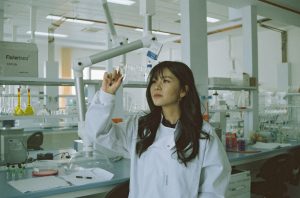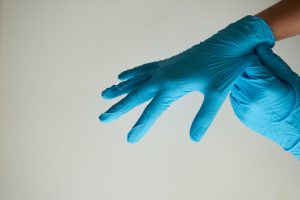An Accidental Run in with IP
Just a few years ago, I knew nothing about the legal profession, much less Intellectual Property’s role in the field as the sector certifying legal rights to patents, trademarks and copyrights. That all changed May of 2020, when my internship working in DC fell through due to Covid. I was panicking about the potential gap in my resume and at a complete loss as to what to do with myself going forward. But I was also absurdly relieved.
I had always been a STEM nerd wannabe, but unfortunately my brain disagreed with me. It seemed as though the things I excelled in (namely reading and writing) were at odds with everything I was truly interested in. I wanted to engage with the science and tech world but was far more comfortable behind a keyboard than in a lab working with test tubes.

So, while frantically looking for another job, it seemed like I’d struck gold when I stumbled across a PPE distribution startup looking for interns. Although the company dealt with surgical gloves, masks and Covid-19 tests, there was no scientific background necessary. Eventually I was deemed the official research and intellectual property intern. I was able to be involved with a company in the medical space despite my total lack of scientific knowledge.
When I joined, the company was so new that it lacked an official logo or company name. Registering these trademarks with the USPTO, or the United States Patent and Trademark Office, was my first task.
The Basics of Trademarks
According to the USPTO, or the United States Patent and Trademark Office, trademarks can be “… any word, phrase, symbol, design, or a combination of these things that identifies your goods or services.” Previously I thought all a company needed was to attach a TM or © sign at the end of their product and that meant ‘This is taken! You can’t use this!’. Fortunately for Intellectual Property (IP) lawyers, but unfortunately for me as a clueless intern, this is not the case.
The Importance of Registered Trademarks for Small Businesses
The importance of having legal protection of their brand and wares was incredibly dire for the company. They were going to be selling seemingly fungible items like nitrile gloves and masks on major platforms, namely Amazon.

My research largely consisted of investigating whether the names and logos the company desired to trademark had already been registered to similar companies with the USPTO. This could potentially lead to issues of trademark infringement. When it came time to officially register, the company consulted firm specializing in IP rights. With their aid, the company acquired officially registered trademarks.
Once registered, I truly felt I had done something concrete. Ultimately, I was helping the start up as well as assure repeat customers that when they ordered from us, they would continue to receive our product. And, after interacting with attorneys who specialized in IP I learned of a new potential direction for my career. Prior to this experience, I wasn’t sold on the idea of practicing law, but from then on I was hooked.
From that project forward, my goal has been to acquire the legal skills necessary to work with companies in science and tech fields. One day, I hope to protect companies whose missions I believe in by making sure their IP rights are secured.
IP at Loyola
During my first few weeks at Loyola, I investigated the IP program and signed up for the Intellectual Property Law Society (IPLS), a club dedicated to getting more students involved in IP and to teach them about what a career in IP would look like. At the first meeting when introduced to the Executive Board, I was stunned to hear that many of them lacked a STEM background like I did. Seeing so many people with similar educational backgrounds committed to IP further instilled confidence in my choice to pursue IP.
Not only that, but Loyola is incredible at facilitating networking events for its members. In particular, I attended the annual IPLAC Speed Networking Event hosted at Loyola. IP attorneys associated with IPLAC, or the Intellectual Property Law Association of Chicago, came to campus and share their wisdom, advice, and encouragement for students who attend. I expressed my worries about going into IP law without a STEM background, and nearly everyone I spoke with either told me that they didn’t have one either, or if they did, that they worked with plenty of other IP attorneys who didn’t. It completely assured me about dedicating my time to IP law, and I was able to make connections with attorneys who offered to meet with me anytime I had doubts.
Loyola’s IP program is intensely dedicated to dispelling myths about the limitations that bar people from becoming an IP attorney, and I can genuinely say that since day one of my 1L year I have never been more sure of my intentions to continue on this path.

Natalie Allen
Assistant Blogger
Loyola University Chicago School of Law, JD 2025
